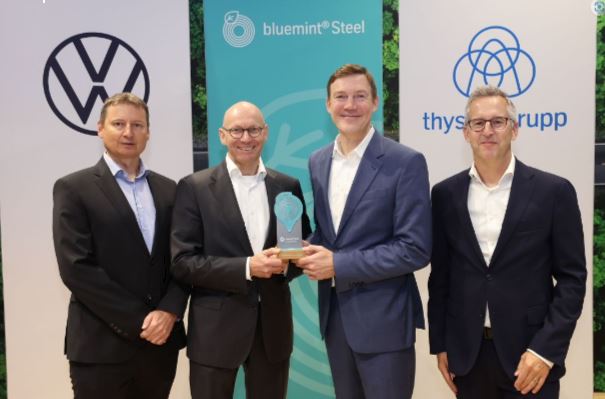Volkswagen and Thyssenkrupp sign agreement for CO₂-reduced steel supply
by David Fleschen

Volkswagen Group and Thyssenkrupp Steel have signed a Memorandum of Understanding (MoU) for the future supply of CO₂-reduced steel from Thyssenkrupp's new direct reduction plant. The agreement, formalized during the International Suppliers Fair (IZB) in Wolfsburg, reinforces both companies' commitment to sustainability and climate action.
Advancing Sustainable Steel Production
Thyssenkrupp's direct reduction plant, set to be operational in 2027, will use hydrogen and renewable energy to significantly cut CO₂ emissions compared to conventional steel production. Initially running on natural gas, the facility will transition to full hydrogen usage over time. The resulting CO₂-reduced steel, known as bluemint® Steel, will be certified according to established standards and could achieve near-zero emissions when powered entirely by green hydrogen.
Dennis Grimm, board spokesperson at Thyssenkrupp Steel, emphasized the importance of this step: "This MoU is a pivotal move in decarbonizing key industrial processes, demonstrating that our long-term partnership with Volkswagen can drive both technological progress and sustainable practices."
Supporting the Automotive Industry’s Climate Goals
Volkswagen is expected to benefit from this innovation, as approximately 15-20% of the emissions from an electric vehicle are tied to the steel used in its production. The CO₂-reduced steel will help Volkswagen lower its supply chain emissions (Scope 3) and contribute to its overall climate goals. Initial deliveries are slated for 2028, with plans for gradual expansion.
Dirk Große-Loheide, Volkswagen’s head of procurement, noted the significance of the agreement: "Decarbonizing our supply chains is essential for Volkswagen to reach carbon neutrality by 2050. Using greener steel is a crucial part of making our future production more sustainable."
Innovative Steel Solutions for Electric Mobility
Steel remains a critical material in automotive manufacturing, with around 1,000 kilograms used in each vehicle. The long-standing partnership between Volkswagen and Thyssenkrupp, particularly in high-strength and lightweight steel solutions, is now extending its focus to electric mobility. The collaboration will support the development of advanced steel components that meet the growing demands of electric vehicles.
This agreement illustrates how strategic partnerships and cutting-edge technologies can drive innovation and sustainability in the automotive and steel industries, contributing to the broader mobility transition.
Source and Photo: Thyssenkrupp

